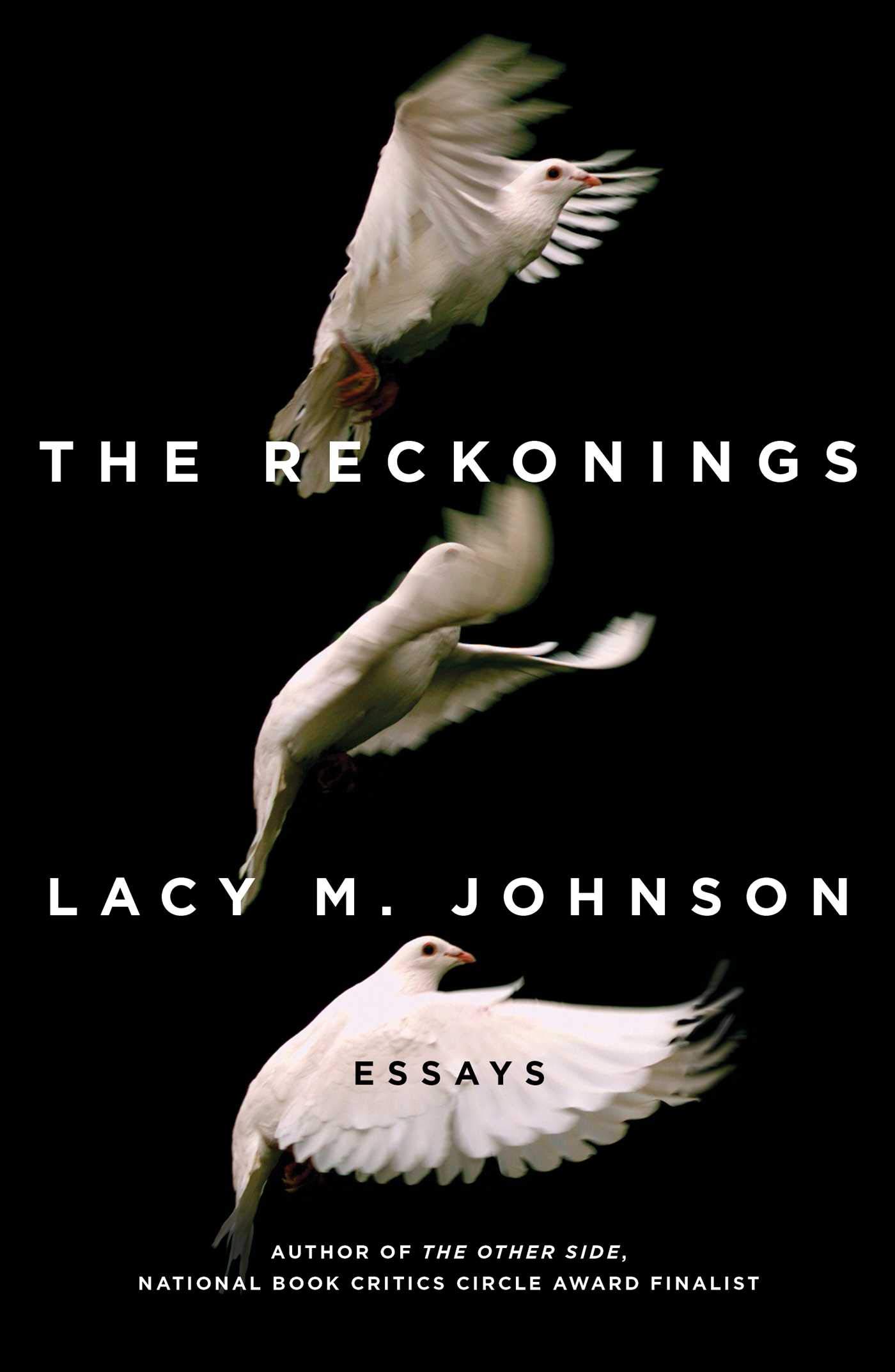Interview with Lacy M. Johnson

Lacy M. Johnson’s The Reckonings is one of the most necessary and powerful essay collections to come out this year. Lacy is also a Loft Wordplay author.
Each essay grapples with an injustice: from sexual assault to the death penalty to white supremacy to environmental disaster. Through her careful examinations, Johnson’s book creates room for an understanding of justice that goes beyond punishment. The focuses here are compassion, mercy, and grace. The essays are exquisitely written; they are both of this moment and timeless. They are challenging and they are revelatory. Johnson leans into the discomfort these topics bring up and advances the questions to consider both our personal and collective responses to injustice.
The Reckonings is Johnson’s third book, and has been named one of the best books of 2018 by Electric Literature, Auto Straddle, Book Riot, Refinery 29 and the Texas Observer. The Other Side was named a finalist for the National Book Critics Circle Award in Autobiography, the Dayton Literary Peace Prize, an Edgar Award in Best Fact Crime, and the CLMP Firecracker Award in Nonfiction. Her writing has appeared in The New Yorker, The New York Times, The Los Angeles Times, Tin House, Guernica, and elsewhere. She lives in Houston and teaches creative nonfiction at Rice University.
In this interview with local author and Loft Literary Center Teaching Artist Ryan Berg, Johnson discusses white privilege, writing through trauma, toxic masculinity, and crafting personal essays.

Ryan Berg: You’ve been reading from and discussing The Reckonings with communities all over the country. Has encountering your readers and hearing their insights taught you anything new about the book?
Lacy M. Johnson: Only that certain people—mostly men, come to think of it—have trouble letting go of their investment in punishment. They seem to believe that by saying, “I don’t want the person who kidnapped and raped me to suffer for what he did,” I am saying, “I forgive him,” or, “I want him to get away with it,” which I am not saying at all. I’ve realized that people seem to imagine those two ideas as the only possible outcomes when someone causes harm: Either 1) They are punished and suffer for what they did, or 2) They are forgiven and get away with it. This seems to me like a failure of imagination on their part, and perhaps a failure on mine to be more explicit about the myriad ways that people can be held accountable for their actions, all of which exist on the spectrum between those two extremes.
RB: Much of your earlier work centered more on personal experience and The Reckonings, although anchored in your story — as a survivor, a mother, a community advocate focusing on issues of justice and healing — moves from the personal to the wider cultural and political narratives that shape our lives. How different was this process of writing from your earlier work?
LMJ: In many ways it was a lot harder. Writing The Other Side in particular required that I find language to tell a story that seemed to have none. That was difficult on a number of levels, but one of the ways it was not difficult was bearing the weight of that pain, because I’d already become so accustomed to carrying it.
With The Reckonings, I’m writing as someone who has lived and written through that trauma—because it’s not a position I can escape—but often in this book I’m engaging with the pain of others. This requires that I take on their trauma and carry it alongside my own. I struggled with that—emotionally, intellectually—and still do. I thought, before this book, that I could take up any of these subjects and then put them down again when I was done writing. But it doesn’t work that way at all.
RB: In your essay “Against Whiteness,” you mention “the failure to reckon," that whiteness is a social construct that requires silence and complicity from people who benefit from it. That feels very timely to conversations that are happening right now. I often ask myself: How can I show up to be a better ally? What is my personal responsibility? What can I do differently? What should I be doing? I feel like that essay started to look for some answers to how white folks can begin to hold themselves and each other more accountable. Was that the mission of the piece?
LMJ: Sure, at least partly. But I think it’s also an appeal to the readers who come to my work because they know I write about sexual assault to acknowledge that gender isn’t the only axis on which violence pivots, and rape isn’t the only form of violence that annihilates its victims. Just as it shouldn’t be the burden of women to dismantle patriarchy or end sexual violence—though women are leading that work—it also shouldn’t be the burden of people of color to do the work of dismantling white supremacy—though they have been for so very long.
Isn’t it time we show up to help? White folks built the institutions of white supremacy; shouldn’t it be our responsibility to tear them down? Perhaps one way we begin doing that—since we’re not all on the same page about this—is by understanding what whiteness is, how it works, and what it costs. That’s where this essay begins, and by the end, it is an argument that whiteness is a pathology—it’s terrorism, even—and that people who have enjoyed its privileges have a moral responsibility to work toward its abolition and to repair its harm. I think this commitment to the abolition of whiteness is only the very tip of the very beginning. This essay is just a beginning.
RB: In “On Mercy,” you contrast two kinds of mercy: little mercy—your work with children who have cancer—and big mercy—the business of capital punishment. I found this to be one of the most compelling essays I’ve read in a long while. Can you share a bit about how you came to craft and shape this piece about two seemingly disparate topics?
LMJ: Thanks. I think I wrote this essay just after The Other Side came out, and after I’d been repeatedly asked this one question by audiences about what I wanted to happen to the man who kidnapped and raped me—people assumed I wanted him dead, and I was so shocked by that. The year before, I had taught writing in a pediatric cancer ward, where many of the children are terminally ill; that same year, 13 men were executed in the state of Texas. I had noticed from the year of doing this work that there is considerable overlap between the language we use to talk about easing the suffering of terminally ill children, and the language we use to talk about state sanctioned killing—in both cases, we talk about “mercy,” though we mean two very different things. I wanted to untangle that.
RB: In “Art in the Age of Apocalypses,” you write about your students at Rice University returning to class after the 2016 presidential election, and how the last thing in the world they wanted to do was workshop. What has the response been since? Do you see writers being “shell-shocked” by the current political landscape or do they feel a called to action?
LMJ: You know, most of my students still do not seem to feel any particular call to action. Someone recently asked me whether I thought this was a generational issue, and I think it is most definitely not. Because if we look to the [Parkland, FL] students [who organized to protest gun violence after the 2018 shooting at Marjory Stoneman Douglas High School], for example, we can see the ways that this generation is not only capable of very effective activism, but are fiercely committed to it because the generations before them have so thoroughly dropped the ball. (Fellow Gen Xers, I’m looking at you.)
I have taught at different institutions where there was a much stronger campus climate of political activism and engagement even among the oft-derided Millennials. Let’s remember that Occupy Wall Street was largely fueled by the energy of Millennials, many of whom had been economically disenfranchised by the stock market crash and were protesting that there was no accountability for the corporate greed that got us into that mess in the first place, though there were bailouts to rescue them from the consequences of their own actions. I think most writers—whether they are students or professionals—who do not feel they have the freedom or the call to “step out of line” should be reminded that there is no one who will ever give you permission to practice your own freedoms except yourself.
RB: In “Speak Truth to Power,” you write that we have fostered “a culture of men who hate women because they have learned to hate the feminine in themselves.” Toxic masculinity is at the heart of so much cultural corrosion: misogyny, white supremacy, xenophobia, homophobia and transphobia, mass shootings. What do you think can be done to disrupt this history?
LMJ: It’s important to remember that masculinity doesn’t become toxic in a vacuum. The toxicity is learned from our culture: Boys learn that if they are vulnerable they will be harmed; they learn there is a limit to the range of emotions they can express; their gender is formed by violence, and so it is no surprise that the form masculinity takes is often also an expression of violence.
I think our inclination is to punish grown men for the culture of violence they inflict, but I think that there would be a lot less violence in the world if we were more generous and loving with young boys—if we taught them better how to love and be loved. I think often of that line from Chimimanda Adiche’s We Should All Be Feminists: “Masculinity is a cold hard cage and we put men and boys in it.” I think we would all benefit by letting them out.
Ryan Berg is a writer, activist, and program manager for the ConneQT Host Home Program of Avenues for Homeless Youth. His debut book, No House to Call My Home: Love, Family and Other Transgressions, won the 2016 Minnesota Book Award for General Nonfiction, the 2016 NCCD Media for a Just Society Award, and was listed as a Top 10 LGBTQ Book of 2016 by the American Library Association. Berg received the New York Foundation of the Arts Fellowship in Nonfiction Literature and the Minnesota State Arts Board Artist Initiative Grant. His work has appeared in Ploughshares, Slate, The Chronicle for Social Change, The Advocate, Salon, Local Knowledge, The Rumpus, and The Sun. Berg has been awarded residencies from The MacDowell Colony, Yaddo, and Virginia Center for the Creative Arts. He lives in Minneapolis.
